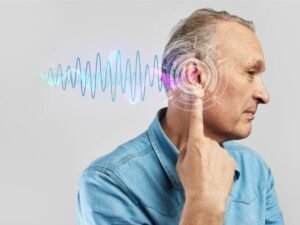What is Tinnitus?
Tinnitus is a condition characterized by the perception of sound when no external noise is present. Often described as ringing, buzzing, hissing, or clicking in the ears. Tinnitus can range from a mild nuisance to a severe disruption in daily life. This condition affects millions of people worldwide and can be temporary or chronic. Let’s find out what are the causes and treatments of Tinnitus. And of course how to deal with it.Causes
Tinnitus is not a disease itself but rather a symptom of an underlying issue. Some common causes include:- Exposure to Loud Noise: Prolonged exposure to loud environments, such as concerts, construction sites, or industrial workplaces, can damage the delicate hair cells in the inner ear, leading to tinnitus. Even a single exposure to an extremely loud noise, like an explosion, can cause lasting damage.
- Hearing Loss: Age-related hearing loss (presbycusis) is a common cause of tinnitus. As hearing declines, the brain attempts to compensate by generating phantom sounds. Noise-induced hearing loss from prolonged exposure to loud sounds is another common cause.
- Ear Infections and Blockages: Earwax buildup, infections, or blockages in the ear canal can interfere with hearing and cause tinnitus symptoms. Proper ear hygiene and prompt treatment of infections can help reduce these effects.
- Medications: Certain medications, including antibiotics, antidepressants, and high doses of aspirin, are known to be ototoxic, meaning they can damage the inner ear and trigger tinnitus. Cancer treatments such as chemotherapy drugs have also been linked to tinnitus.
- Medical Conditions: Conditions such as Meniere’s disease, high blood pressure, cardiovascular disease, and temporomandibular joint (TMJ) disorders have been linked to tinnitus. Poor circulation and certain autoimmune disorders can also contribute.
- Head or Neck Injuries: Trauma to the head or neck can affect the auditory system and lead to persistent tinnitus. Concussions and whiplash injuries may also trigger or worsen symptoms.
Symptoms
Tinnitus manifests differently for each person, but common symptoms include:- A continuous or intermittent ringing, buzzing, clicking, or hissing sound in one or both ears.
- Fluctuations in pitch and volume, sometimes worsening in quiet environments.
- Difficulty concentrating or sleeping due to persistent noise perception.
- Increased sensitivity to external sounds (hyperacusis) in some cases.
- A sensation of fullness or pressure in the ears, particularly when associated with an underlying condition like Meniere’s disease.
How to treat Tinnitus?
Diagnosing tinnitus typically involves a hearing examination by an audiologist or an ear, nose, and throat (ENT) specialist. Tests may include:- Hearing Tests: To assess the extent of hearing loss and determine if tinnitus is linked to auditory impairment.
- Imaging Tests: MRI or CT scans to check for underlying conditions such as tumors, vascular issues, or structural abnormalities.
- Medical History Review: To identify possible causes such as medication side effects, past exposure to loud noises, or head and neck injuries.
- Tinnitus Matching: A test that helps identify the frequency and volume of the tinnitus sounds a person perceives, aiding in potential treatment approaches.
How to deal with it?
While there is no universal cure for tinnitus, several strategies can help manage the condition:- Hearing Aids: If tinnitus is associated with hearing loss, hearing aids can amplify external sounds and reduce the perception of tinnitus. Some hearing aids also include built-in sound therapy features.
- Sound Therapy: White noise machines, nature sounds, or soft background music can help mask tinnitus and make it less noticeable. Some people find relief through smartphone apps that generate relaxing soundscapes. Another sound therapy approach is habituation therapy, which helps individuals gradually become accustomed to tinnitus sounds so they become less noticeable over time. Masking therapy is also a commonly used technique where external sounds are introduced to cover up the tinnitus, making it less prominent and easier to ignore.
- The Tinnitus Help App provides both masking and habituation therapyWatch the short demo here or visit our YouTube channel directly.
- Cognitive Behavioral Therapy (CBT): This form of therapy helps individuals change their emotional response to tinnitus, reducing distress and improving quality of life. Tinnitus Retraining Therapy (TRT) is another approach that combines counseling with sound therapy.
- Lifestyle Adjustments: Reducing caffeine, alcohol, and nicotine intake, managing stress, and getting adequate sleep can help lessen tinnitus symptoms. Regular exercise and relaxation techniques such as yoga or meditation can also provide relief.
- Medication and Supplements: While no specific medication cures tinnitus, some people find relief with certain supplements like ginkgo biloba, magnesium, or zinc. Anti-anxiety or antidepressant medications may be prescribed if tinnitus significantly impacts mental well-being.
- Avoiding Silence: Many individuals find that tinnitus worsens in completely silent environments. Using background noise, such as a fan or soft music, can help make the ringing less noticeable.
Prevening Tinnitus
While not all cases of tinnitus can be prevented, there are several steps individuals can take to reduce their risk:- Protect Your Ears: Wearing earplugs or noise-canceling earmuffs in loud environments, such as concerts or while operating machinery, can help prevent noise-induced tinnitus.
- Limit Headphone Volume: Listening to music at high volumes through headphones or earbuds can damage hearing over time. Keeping the volume at a moderate level and taking breaks can help protect the ears.
- Maintain Cardiovascular Health: Since poor circulation can contribute to tinnitus, staying active and maintaining healthy blood pressure levels can help minimize risk.
- Avoid Ototoxic Medications When Possible: If a doctor prescribes medications known to be ototoxic, discussing alternatives or monitoring for symptoms can help mitigate potential damage.







